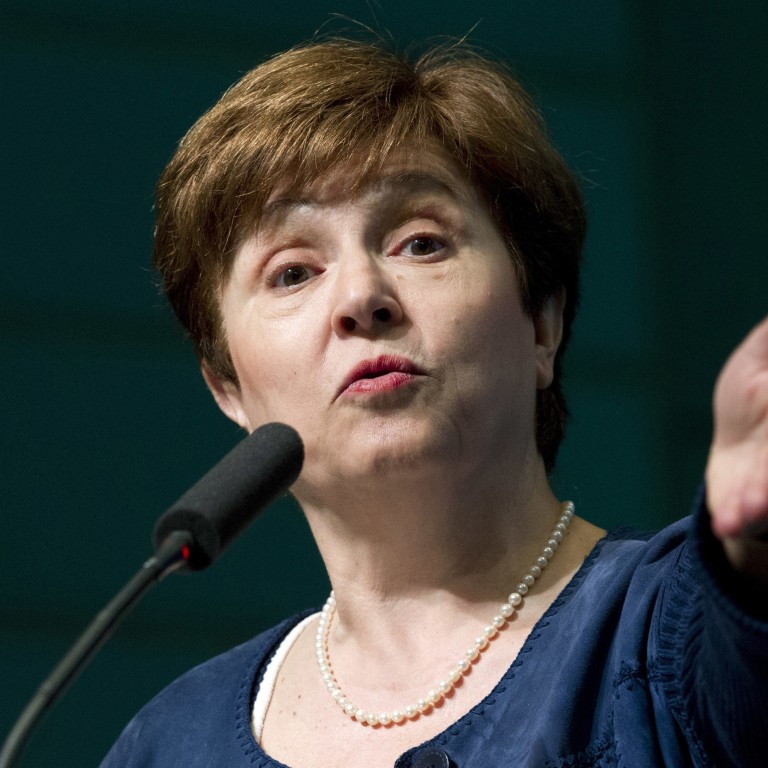
US-China trade war may cost US$700 billion by 2020 in synchronised global slowdown, new IMF chief says
- Global growth rate this year is expected to slow to lowest rate in a decade, new IMF head Kristalina Georgieva says
- Global corporate debt at risk of default in event of global downturn would be higher than during global financial crisis, the economist warns
The trade war between China and the United States could cost an increasingly fractured global economy about US$700 billion, or 0.8 per cent of gross domestic product, by 2020, Kristalina Georgieva said in her maiden speech as International Monetary Fund chief on Tuesday.
“We have spoken in the past about the dangers of trade disputes. Now, we see that they are actually taking a toll,” the Bulgarian economist said, according to a text of her opening address to the annual International Monetary Fund (IMF)/World Bank meetings in Washington.
In updated economic forecasts scheduled for release next week, the IMF, an organisation of 189 countries working to increase global monetary cooperation, is expected to downgrade the global growth outlook for the fifth time since October 2018. In July, it projected that the world economy would grow 3.2 per cent this year and 3.5 per cent in 2020.
New IMF analysis also suggests that if a major global downturn were to occur, corporate debt at risk of default would rise to US$19 trillion, or nearly 40 per cent of the total debt in eight major economies – and above the level seen during the global financial crisis a decade ago, Georgieva said.
Her comments come as global central banks have embarked on a new round of interest rate cuts and easing of monetary policy measures this year. However, Georgieva warned of the limits of monetary policy amid financial vulnerabilities, urging countries to boost fiscal policy instead.
“Low interest rates may give some policymakers additional money to spend,” she said. “That advice will not work everywhere. Globally, public debt is near record levels. Now is the time for countries with room in their budgets to deploy – or get ready to deploy – fiscal firepower.”
The global economy is facing growing fractures and rifts that could lead to changes that last a generation, including broken supply chains and a “digital Berlin Wall” that forces countries to choose between technology systems, she said.
The global economy is now in a synchronised slowdown … This widespread deceleration means that growth this year will fall to its lowest rate since the beginning of the decade
Many more countries will soon feel the impact of these conflicts as economies have become more interconnected in the past two years, she added.
“The global economy is now in a synchronised slowdown,” Georgieva, 66, said. “In 2019, we expect slower growth in nearly 90 per cent of the world. This widespread deceleration means that growth this year will fall to its lowest rate since the beginning of the decade.”
Georgieva called on countries to address legitimate concerns related to their trade practices, such as reducing trade subsidies, as well as increasing protections for intellectual property rights and eliminating forced technology transfers.
China wants the timetable for negotiations to extend into 2020 to work through details, even though US President Donald Trump has made clear his preference for a comprehensive deal.
Analysts hope that negotiators will agree to an interim deal as part of a step-based process that will allow Chinese agricultural and energy purchases, and the partial rollback of tariffs.
But on Monday the US blacklisted 28 Chinese public security bureaus and technology firms while implicating them for human rights violations in China’s Xinjiang province, escalating its economic war on yet another front.
“This new shift in US strategy against China is now raising suspicions amid growing pressure stateside that the administration may throw its support behind the pro-democracy protest in Hong Kong,” said Stephen Innes, Asia-Pacific market strategist at SPI Asset Management.
“All of which suggests a whole lot more than tariffs will be on the dinner menu when Chinese Vice-Premier Liu He visits Washington for trade talks with his US counterparts.”

